Notes Toward a New Language: On Nourishment
BY Cynthia Cruz
"To feed” is the most basic verb, the most fundamental, the most rooted. It expresses the primordial activity, the primary, basic function, the act “I” engage in even before I am born or begin breathing. Because of it I belong to the earth, forever. Like the smallest animal crawling in the dirt, like the smallest plant, I began by feeding myself.
--Francois Jullian
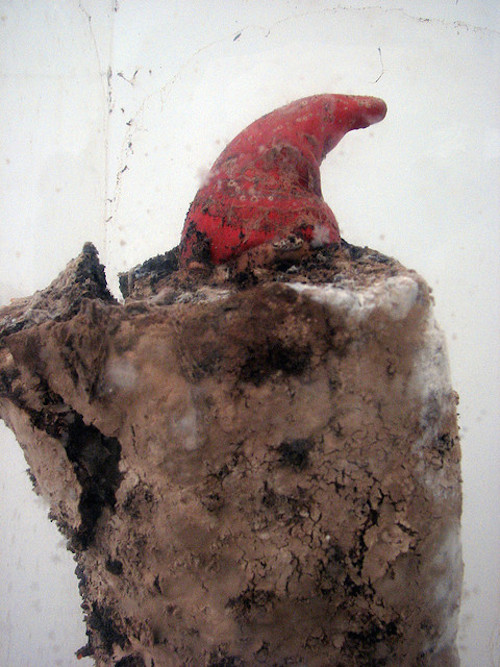
What we do with sustenance, defines us. By consuming, we become that which we consume. When the infant takes in her mother’s milk, she, in essence, becomes one with her mother. When I consume, I become one with what I consume. Furthermore, I become that which what I consume derives from. In other words, that which I swallow, swallows me. I become it. And I am bound unto the world when I digest sustenance from it: bread, sweets, black coffee—anything I take into my body, I become. The world becomes the mother and I am bound to it. The milk of the world binds us, inexplicably, to it. As Novalis writes, “All enjoyment, all taking in and assimilation, is eating, or rather: eating is nothing other than assimilation.”
In The Arachnean and Other Texts, Fernand Deligny describes quite beautifully the sense of alienation that occurs when you realize your ideas do not match those of your colleagues/society:
Yesterday evening, I listened to two avant-garde psychiatrists on France Culture, one Italian and one French, who were in agreement on a formula according to which one should work in such a way as to treat each mental patient as a "subject." Hence the close connection--sought by them-- between their professional approach and that of political parties.
Hearing them, I felt quite alone. (153).
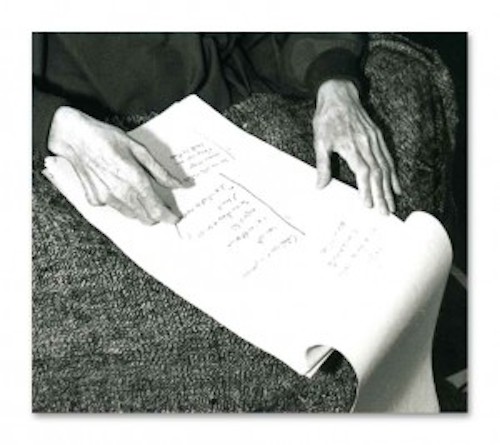
Deligny who did not see autistic children or mentally ill patients as “Other,” as “idiots” or otherwise less than, is made “Other” by his inability to side with the powerful. Not surprisingly, his writing is non-hierarchal. His entire book The Arachnean and Other Texts can be read both as a collection of Deligny’s realizations about issues of language and power, and the treatment of autistic children but also as a handbook of how to live. The structure of his writing is like a spider's net--loose, but concise.
Deligny did not separate himself from the children he worked with. As Francois Dosse writes in Gilles Deleuze & Felix Guattari: Intersecting Lives: "Deligny invented an entire poetic language to describe the behavior of young autistic patients. A child who spins is considered to be making a shadow; a child shifting from one foot to the other is making a cloud balance(72)."
But it is often too much for us—the troubling that occurs when we begin to imagine the Other, Unheimlich (not at home in the world). It hurts us too much. Then, when we stop to imagine ourselves in their place, also lost, not at home in the world, this last bit, what Jacques Derrida calls "remnant" our not being home in the world, is too much for us--we turn away, refusing.
In "An Interview with Jacques Derrida on the Limits of Digestion" Daniel Birnbaum and Anders Olsson spoke with Derrida about nourishment and consumption. In the interview, Derrida stated:
In Glas, my work on Hegel, I had already become interested in the figures of incorporation that are to be found in speculative thought-- the very notion of comprehending as a kind of incorporation. The concept of "Erinnerung," which means both memory and interiorization, plays a key role in Hegel's philosophy. Spirit incorporates history by assimilating, by remembering its own past. This assimilation acts as a kind of sublimated eating--spirit eats everything that is external and foreign, and thereby transforms it into something internal, something that is its own. Everything shall be incorporated into the great digestive system--nothing is inedible in Hegel's infinite metabolism.
Here, Derrida is referring to his philosophical text, Glas, a book in which he writes simultaneously about Hegel and Genet.
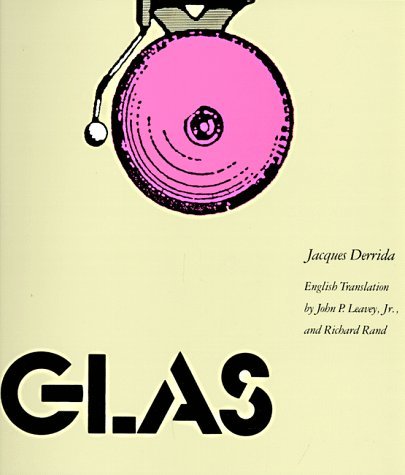
Literally, he writes about one author on one side of the page and the other on the others side. It is the most poetic of his texts:
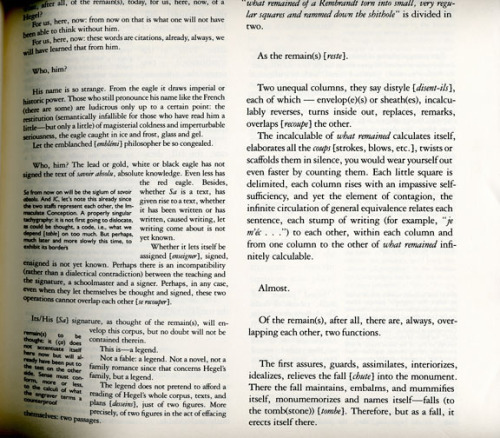
This idea “The very notion of comprehending as a kind of incorporation" becomes the key to understanding the delineation between who is considered an “insider” and who is, by default, considered “outsider.” Essentially, what this statement suggests is that we can only incorporate that which we understand. What does this mean, then, for those who we don’t understand?
This aligns with Fernand Deligny's work with autistic children (see my previous blog on The Body). Unless the “other’s” language matches ours, the "Other" remains "other" (rather than, for example, thinking that perhaps they have the preferred or "major" language, and we, the less preferred, or "minor" language). In sum, what we cannot understand, what remains outside the boundary of our (necessarily limited) realm of understanding, we cannot assimilate or take in.
Later in the interview when asked, “How is this massive project on eating related to deconstruction, as we have come to know it? If understanding can be compared to a kind of eating, what would a deconstructionist reading of a text be?” Derrida replies:
It would mean respect for that which cannot be eaten—respect for that in a text which cannot be assimilated. My thoughts on the limits of eating follow in their entirety the same schema as my theories on the indeterminate or untranslatable in a text. There is always a reminder that cannot be read, that must remain alien. This residue can never be interrogated as the same, but must be constantly sought out anew, and must continue to be written.
That which seems strange, something outside the limits of our own personal experience, is not, then, consumable. This brings to mind the idea of the “idiot.” The idiot’s stutter is an idea I have written about elsewhere and may elaborate on further in an upcoming piece but, suffice to say: one who speaks in a stutter is often deemed an idiot. Of course, foreigners stutter, as do people who are hesitant because either they are taking time to think through their thoughts before speaking or they do not have a sense that they can take up the same space that others do.
Those we do not understand, who we cannot take in, are deemed “idiots” because they do not speak in our language. The labeling of the “Other” as “idiot” of course further marginalizes her, keeping her behind the line drawn. And when we are extremely perplexed, when we simply can't fathom what the other is doing, saying, or making, we call that person “insane.” This is often the case with female artists.
Interestingly, the German word for “insane” is verrückt, which is the past participle for verrücken, meaning “to displace,” precisely what we do with people we cannot understand. Interesting, too, that rather than interpret what we can’t grasp as genius, we must, instead, contain it by labeling the person “Other,” and pushing the work and the artist away.
Clarice Lispector’s The Hour of the Star, her final novel about a young typist living in extreme poverty in the slums of Rio, can be considered an homage to the many girls in Brazil living in extreme poverty which is also how Lispector grew up. Macabea, the main character, hesitant to speak or take up space, is called an “idiot” many times by the narrator. Of course, the reasons for her so-called idiocy are superficial (she doesn't know who Caruso is, for example; is not "cultured") and do not in any sense demonstrate her intelligence. In fact, her behavior and the way she moves through the world demonstrate what I would call intelligent: she is thoughtful, thinking before speaking, curious, questioning, and she has a rich inner life, prone to daydream and reverie.
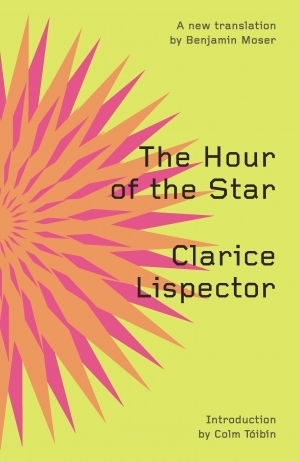
Also,throughout the book, Lispector makes references to various foods as well as the idea of consuming. In fact, often, the connection between the rich and food is explicit: “Because among the dirty disorder of the lowest reaches of the middle class there was nonetheless the dull comfort of people who spend all their money on food (57).” Food is divided between the food of the poor and the food of the rich. Macabea cannot consume the stuff of the rich. When Macabea does ingest the rich (or richer) people’s food, she becomes sick:
Gloria lived on General so-and-so street, very pleased to live on a street named after a military leader, she felt safer. In her house there was even a telephone. It might have been one of the few times that Macabea saw that for her there was no place in the world and exactly because Gloria gave her so much. That is, a cup filled to the brim with thick real chocolate mixed with milk and many kinds of sugared buns, not to mention a small cake. Macabea, while Gloria was out of the room—secretly robbed a cookie. Then she asked forgiveness of the abstract Being who gives and takes. She felt forgiven. The Being forgave her everything.
The next day, Monday, maybe because of the liver affected by the chocolate or because she was nervous about drinking rich people’s stuff, she got sick. She didn't vomit afraid to waste the chocolate(57).
Macabea describes herself as being empty or “nothing” and this nothingness is directly related to her taking nothing in. For example, Lispector writes, “Eating the host will be tasting the flavorlessness of the world and bathing in the no (11).” Macabea refuses the world, she does not take it in:
She had what’s known as an inner life and didn't know it. She lived off herself as if eating her own entrails. When she went to work she looked like a gentle lunatic because as the bus went along she daydreamed in loud and dazzling dreams (29).
Macabea's frequent vomiting can be seen as a purging of the world--Macabea’s wish not to have the world inside of her. And she doesn't need it—she is filled with life. And though the world sees her as an “idiot” she is the one with the rich inner life: free of her self (ego), she is then available to truly look at, comprehend and see the world while seemingly, others only see the things in it. She is, one might then say, a bit autistic in that others cannot read her, seeing her as idiotic and "out of it" when, in reality, the very tools by which she is bing measured are perhaps idiotic and irrelevant.
In Herta Müller’s book, The Hunger Angel, a book chronicling the experience of seventeen year old Leo Auberg’s experience living in a Russian camp, Müller writes of the desire to live as a desire to devour the world:
No words are adequate for the suffering caused by hunger. To this day I have to show hunger that I escaped his grasp. Ever since I stopped having to go hungry, I literally eat life itself. For sixty years, ever since I came back from the camp, I have been eating against starvation(18).
After having nothing, after being deprived, one has a hunger to live, to take in the world. Also of course, hunger is also just plain hunger, free from metaphor:
What can be said about chronic hunger. Perhaps that there’s a hunger that can make you sick with hunger. That it comes in addition to the hunger you already feel. That there is a hunger that is always new, which grows insatiably, which pounces on the never-ending old hunger that already took such effort to tame. How can you face the world if all you can say about yourself is that you’re hungry(17).
Hunger, chronic hunger, leaves one wordless. The starvation speaks in silence. Its language is the stutter, the stammer. If you have been around someone who is suffering from chronic hunger, you will know what death looks like. It lives inside the eyes and it is like a howl that has taken root inside the person’s body.
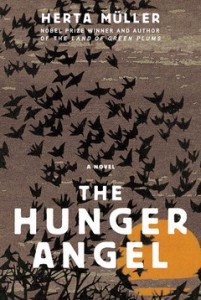
In Shirin Neshat's film, Women without Men, a film about four Iranian women and their lives in Tehran in 1953 during the US-backed coup that put the Shah back in power, one of the four women, Zarin, is both anorexic and a prostitute working in a brothel.
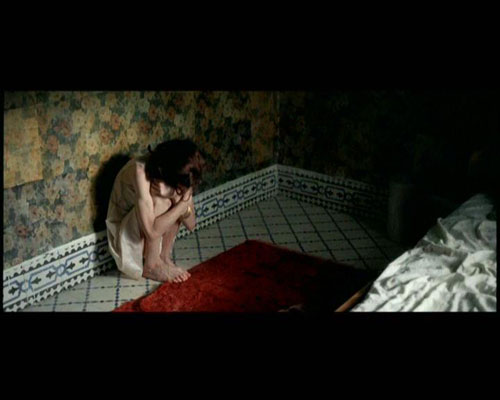
Her anorexia, her refusal to take in food, is also, at the same time, a refusal to take in the world, a world where women are sold for money; a world she cannot comprehend.
What happens, then, for one who feels herself outside the boundaries of society? And how does this affect her ability to make art?
In the end, what we cannot or will not understand, or those we don’t recognize as part of our selves,--remain un-digestible. Not assimilated into the tide of culture, they remain outside the warm bright lights of the city in shanties, on the streets, in the asylums. They reside outside the walls of our minds. And though some artists and writers attempt to feed these bits of lost narrative to us—artists, for example, who integrate parts of what we refuse to see inside their work--again: if we don’t recognize our selves in these narratives, they do not exist for us, they remain invisible. As a result, the artists, themselves, become indigestible—we push them, too, to the corners of our minds.
Cynthia Cruz is a poet, novelist, and nonfiction writer. She is the author of the poetry collections...
Read Full Biography

